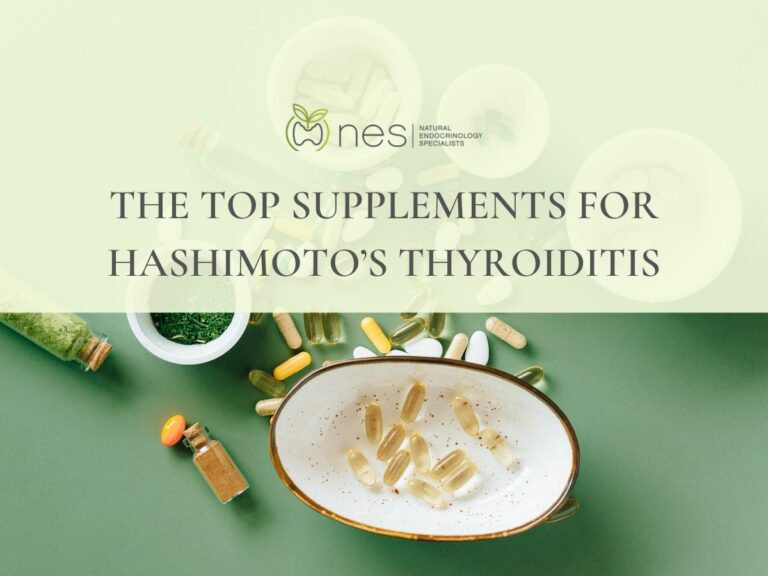Hashimoto's thyroiditis is an autoimmune disorder that impacts the thyroid gland, often leading to hypothyroidism. This condition is characterized by inflammation in the thyroid gland and the production of antibodies that attack the thyroid tissue.
While medications are commonly prescribed to manage Hashimoto's, certain supplements may offer valuable support in alleviating symptoms and promoting thyroid health.
- Selenium
Selenium, a trace mineral, plays a vital role in thyroid function and immune system regulation. Research indicates that supplementing with selenium can help reduce the levels of thyroid peroxidase antibodies, which tend to be elevated in individuals with Hashimoto's.
A study published in the Journal of Clinical Endocrinology & Metabolism showed that 200 mcg of selenium supplementation significantly lowered thyroid peroxidase antibody levels and improved the overall quality of life in people with Hashimoto's thyroiditis.1 Foods rich in selenium include Brazil nuts, fish, and beef. Eating 2 Brazil nuts daily contains a total 136-182 mcg selenium.2 Eating a 3 oz serving of yellowfin tuna contains 92 mcg of selenium which can help with reaching daily nutrient goals. Top sirloin beef contains 28 mcg of selenium per 3 oz and is another great source of this mineral.3
- Vitamin D
Vitamin D is essential for immune system modulation and overall health maintenance. Deficiency of vitamin D is common among Hashimoto's patients and is often linked to autoimmune disorders. A study demonstrated that vitamin D supplementation effectively reduced thyroid antibody levels and improved thyroid function in individuals with autoimmune thyroiditis.4 The RDA for vitamin D is between 15-20 mcg per day for adults. Great sources of vitamin D are found in fatty fish including cod liver oil, salmon, and swordfish. Incorporating these foods can increase vitamin D levels and 1 tablespoon of cod liver oil contains 34 mcg, a 3 oz serving of swordfish contains 14 mcg, and a 3 oz serving of salmon contain 11 mcg of vitamin D.3
- Omega-3 Fatty Acids
Omega-3 fatty acids, which are commonly found in fish oil supplements, possess anti-inflammatory properties that can help manage the inflammation associated with Hashimoto's thyroiditis. Additionally, these fatty acids support a healthy immune response. A study published in the Journal of Nutritional Biochemistry found that omega-3 supplementation led to a reduction in thyroid inflammation and oxidative stress in autoimmune thyroiditis.5 Adequate intake of omega-3 fatty acids is 1.7 g per day. Herring and salmon are amazing sources of omega-3 fatty acids since a 3 oz serving contains at least 1 g of omega-3 fatty acids.
- Ashwagandha
Ashwagandha, an adaptogenic herb, offers potential benefits for stress reduction and immune modulation. Some studies suggest that Ashwagandha supplementation may help stabilize cortisol levels and mitigate stress-related impacts on thyroid function. A pilot study conducted by Sharma et al. in 2018 reported improvements in thyroid function and quality of life among participants with subclinical hypothyroidism who took Ashwagandha.6 Doses of 300 mg 2 times per day have been shown to decrease stress levels. 7
- Zinc
Zinc is a crucial mineral involved in gene expression, cell division and growth, and a variety of enzymes related to immune and reproductive functioning. Studies have explored the connection between zinc concentrations and thyroid hormone levels. Low zinc concentrations are associated with hypothyroidism, while high concentrations are linked to hyperthyroidism.8 Zinc supplementation may be beneficial in increasing thyroid hormone levels in individuals with Hashimoto’s. Food sources of zinc include oysters which contain 38.4 mg per 1 oz, ground beef with 5.3 mg per 3 oz, quinoa with 1 mg per ½ cup, and pumpkin seeds which contain 6.7 mg per cup.8
While medication remains a cornerstone in the management of Hashimoto's thyroiditis, certain supplements show promise in supporting thyroid health and managing symptoms. It is vital to remember that these supplements should complement medical treatment and not replace it. Consultation with a healthcare provider before adding supplements to your routine is essential to ensure their compatibility with your specific condition and overall health.
Sources
- Gartner, R., Gasnier, B. C., Dietrich, J. W., & Krebs, B. (2002). Selenium supplementation in patients with autoimmune thyroiditis decreases thyroid peroxidase antibodies concentrations. Journal of Clinical Endocrinology & Metabolism, 87(4), 1687-1691.
- National Institutes of Health. Office of Dietary Supplements. Selenium - Consumer Fact Sheet. https://ods.od.nih.gov/factsheets/Selenium-Consumer/
- Stepnick GSA, Smith JL, Carr TP. Advanced Nutrition and Human Metabolism. Cengage Learning, Inc; 2022.
- Tamer, G., Arik, S., Tamer, I., Coksert, D. (2011). Relative vitamin D insufficiency in Hashimoto’s thyroiditis. Thyroid, 21(8), 891-896.
- Mariani, F., Roncucci, L., Malaguti, P., & Ndiaye, M. (2013). Modulation of thyroid autoregulation and thyroidal function by dietary n-3 fatty acids. The Journal of Clinical Endocrinology & Metabolism, 98(8), 3202-3208.
- Sharma, A. K., Basu, I., & Singh, S. (2018). Efficacy and safety of Ashwagandha root extract in subclinical hypothyroid patients: a double-blind, randomized placebo-controlled trial. The Journal of Alternative and Complementary Medicine, 24(3), 243-248.
- Speers AB, Cabey KA, Soumyanath A, Wright KM. Effects of Withania somnifera (Ashwagandha) on Stress and the Stress- Related Neuropsychiatric Disorders Anxiety, Depression, and Insomnia. Curr Neuropharmacol. 2021;19(9):1468-1495. doi:10.2174/1570159X19666210712151556
- Zhou Q, Xue S, Zhang L, Chen G. Trace elements and the thyroid. Front Endocrinol (Lausanne). 2022;13:904889. Published 2022 Oct 24. doi:10.3389/fendo.2022.904889
- FoodData Central. FoodData Central. National Agricultural Library, U.S. Department of Agriculture. https://fdc.nal.usda.gov/fdc-app.html#/food-details/170188/nutrients.




